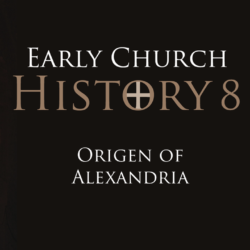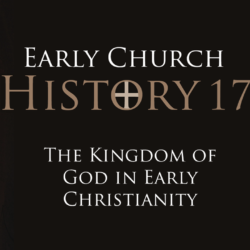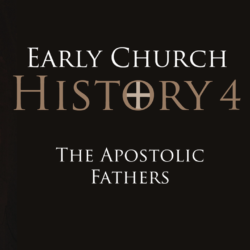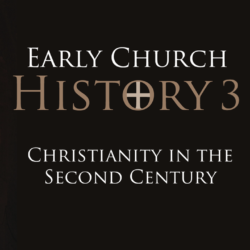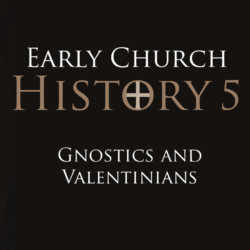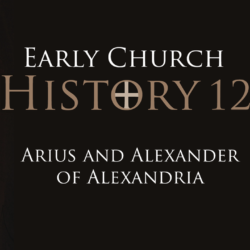This is part 7 of the Early Church History class.
Philo of Alexandria was the most well-known representative of Hellenistic Judaism in the first century. His many books combine Platonism with scripture via allegory–a daring project that had a massive influence on Christian thinkers. Clement of Alexandria followed in Philo’s footsteps a century later, doing for the Christian scriptures what Philo had done for the Jewish bible. In addition to covering these two we’ll take a couple of detours to learn about the city of Alexandria as well as a few of Plato’s important ideas. Although overlooked today in most discussions of the history of Christology, Philo and Clement lay the foundations upon which Origen, the Cappodocians, and Augustine would build generations later.
Listen to this episode on Spotify or Apple Podcasts
—— Links ——
- More Restitutio resources on Christian history
- More classes here
- Support Restitutio by donating here
- Join our Restitutio Facebook Group and follow Sean Finnegan on Twitter @RestitutioSF
- Leave a voice message via SpeakPipe with questions or comments and we may play them out on the air
- Intro music: Good Vibes by MBB Attribution-ShareAlike 3.0 Unported (CC BY-SA 3.0) Free Download / Stream: Music promoted by Audio Library.
- Who is Sean Finnegan? Read his bio here
—— Notes ——
Alexandria (founded 331BC)
- named after Alexander the Great
- capital of Egypt for a millennium (until the Muslims came in 641)
- still the largest city on the Mediterranean
- had the Pharos light house (one of the 7 wonders of the ancient world)
- had a massive world-famous library
- port city providing grain to Rome
- center of philosophical learning
- diverse and populous metropolis
Philo of Alexandria (20 BC – AD 50)
- Jewish Platonist philosopher
- heavily influenced by Plato
- The true realm is the upper, spiritual, invisible world. (Allegory of the Cave)
- A craftsman created our world based on the pattern of the eternal realm. (Timaeus)
- Our souls are immortal and will escape our bodies at death, enabling us to perceive the eternal, unchanging realm. (Phaedo)
- applied allegorical interpretation method to the Old Testament (LXX)
- Logos
- God’s organ to create and govern universe
- second place next to God
- God is the Father and wisdom [Sophia] is the mother of the Word [Logos]
Clement of Alexandria (AD 150 – 215)
- grew up non-Christians
- traditional religion
- mystery religion
- schools of philosophy
- found Pantaenus to teach him
- books
- Protrepticus (Exhortation to Greeks) c. 195
- Paedagogus (Tutor or Educator) c. 198
- Stromata (Miscellanies) c. 203
- Who Is the Rich Man Who Will Be Saved?
- beliefs
- heavily influenced by Plato and Philo
- Ideal Christian is “the gnostic”; try to “out gnostic” the Gnostics and take the label back.
- concerned about the whole Christian life, not just beliefs seeking pleasure is sin
- Wine is ok in strict moderation.
- Laughter should be controlled.
- esotericism (especially in the Stromata)
- Christology
- God is the unknowable, supreme, unbegotten one.
- The Son “is nearest to him who is alone the Almighty One”.
- The Logos is chief among God’s saints who, like us, worships God.
- “Thus the idea of the Logos is the centre of Clement’s theological system and of all his religious thinking. However, the supreme idea in Christian thought is not the idea of the Logos but the idea of God.”[1]
- legacy
- set the precedent for combining Platonism with the Bible through the use of allegory, a strategy that came to dominate for centuries
- became the teacher of Origen who, as we’ll see in our next session, was the most influential Christian theologian of the third century
- was regarded as a saint by Roman Catholic and Eastern Orthodox churches, but then they changed their minds
Review
- Alexandria, Egypt was a major metropolis from which not only grain but philosophical ideas spread to the Mediterranean world.
- Philo was a first-century Jew who applied Middle Platonism to the Old Testament via allegory.
- Influenced by Plato’s Timaeus, Philo used the concept of Logos to separate the high God from creation.
- For Philo the Logos was God’s organ to create and govern the world.
- Clement of Alexandria drew upon Philo’s work and applied it to the New Testament.
- Clement wanted Christians to live in a proper and moderate manner.
- In an effort to show the supremacy of Christianity, Clement attempted to out-gnostic the Gnostics, labelling the enlightened Christian “the gnostic.“
- For Clement, the Logos is subordinate to the Father, who alone is the true God.
- He might have believed that the Logos existed eternally as God’s high priest.
[1] Johannes Quasten, Patrology, vol 2 (Notre Dame, IN: Christian Classics, Ave Maria Press, 1983), 23.

